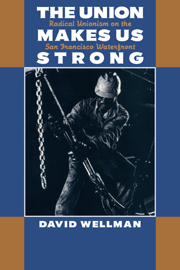Book contents
- Frontmatter
- Contents
- Preface
- Notes on unpublished sources
- PART I LABOR RADICALISM REVISITED
- PART II LOCAL COMMUNITY AND “TUMULTUOUS” DEMOCRACY: THE SOCIOCULTURAL FOUNDATIONS OF UNIONISM ON THE SAN FRANCISCO WATERFRONT
- PART III UNIONISM, WORK, AND TECHNOLOGICAL CHANGE
- PART IV WAGING THE BATTLE FOR WORKPLACE CONTROL ON CONTRACTUAL TERRAIN
- PART V AGREEING TO DISAGREE: BEING DEFENSIBLY DISOBEDIENT
- Conclusion: Trade union exceptionalism or prefigurative politics?
- Appendix: Doing field research: An ethnographic account
- References
- Name index
- Subject index
Conclusion: Trade union exceptionalism or prefigurative politics?
Published online by Cambridge University Press: 11 November 2009
- Frontmatter
- Contents
- Preface
- Notes on unpublished sources
- PART I LABOR RADICALISM REVISITED
- PART II LOCAL COMMUNITY AND “TUMULTUOUS” DEMOCRACY: THE SOCIOCULTURAL FOUNDATIONS OF UNIONISM ON THE SAN FRANCISCO WATERFRONT
- PART III UNIONISM, WORK, AND TECHNOLOGICAL CHANGE
- PART IV WAGING THE BATTLE FOR WORKPLACE CONTROL ON CONTRACTUAL TERRAIN
- PART V AGREEING TO DISAGREE: BEING DEFENSIBLY DISOBEDIENT
- Conclusion: Trade union exceptionalism or prefigurative politics?
- Appendix: Doing field research: An ethnographic account
- References
- Name index
- Subject index
Summary
ACCORDING to conventional wisdom, the war between the classes ended decades ago in North America. Capital won, easily and decisively. By most accounts, labor was defeated not only politically, but lost culturally and morally as well. “The myth of the liberating power of the proletariat has dissolved,” wrote the formerly socialist Italian novelist Ignazio Silone in the early 1950s, “along with that other myth of progress” (1954:25). Agreeing, the American political sociologist S. M. Lipset observed less than a decade later that intellectuals of the democratic left who once thought the proletariat was necessarily a force for liberty, racial equality, and social progress, faced a “tragic dilemma” (1963:87). They could no longer pin their hopes for a more just and equitable world on the Western working class; alternative visions for the good society would need another agent.
Critical theorists of the Frankfurt school and postmodern scholars concur. As Craig Reinarman notes, they find little hope for opposition in what they see as the debased, commodified culture of the modern world. Most believe that mass consumption culture and the welfare state so dominate social life that critique and resistance is impossible among the manipulated, managed working classes. The “singular achievement” of advanced industrial society, wrote philosopher Herbert Marcuse, is the “containment of social change” (1966:xii). Post-Marxist, poststructuralist theorists share this pessimism.
- Type
- Chapter
- Information
- The Union Makes Us StrongRadical Unionism on the San Francisco Waterfront, pp. 300 - 318Publisher: Cambridge University PressPrint publication year: 1995



